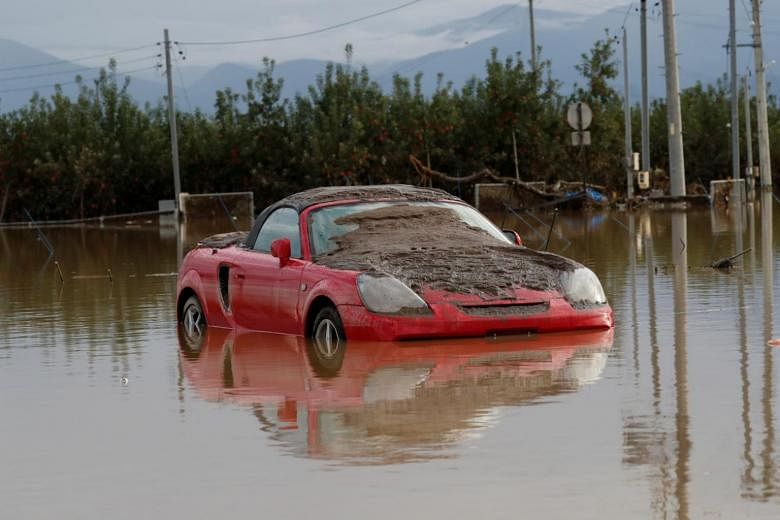TOKYO • Japan awoke yesterday to flooded rivers and burst levees, forcing rescue helicopters to winch stranded residents from roofs and balconies in several locations in the wake of Typhoon Hagibis, the country's largest storm in decades.
Some of the worst damage hit Nagano city in central Japan, where the Chikuma River burst its banks, inundating large swathes of land in brown water.
At one evacuation centre there, Mr Kiyokazu Shimokawa, 71, said he waited all night with his wife and mother until they were finally rescued yesterday afternoon.
"I made the mistake of figuring that as long as we were on the second floor of the house, we'd be fine," he told Reuters. "When we realised that maybe we should evacuate, it was too late - the water rose very quickly."
Ms Rie Hasegawa said she never imagined her landlocked town would face a water-related disaster, recounting how shocked she was at how fast it all happened. "The force of the water was incredible. It was dark, frightening, and I thought this might be the end," said the woman in her 30s.
Mr Hajime Tokuda, a finance professional living in Kawasaki near Tokyo, told Agence France-Presse that the water "came up higher than my head in the house". He moved to his family's home nearby, but that flooded too and they had to be rescued by boat.
In Higashi Matsuyama city, north-west of Tokyo, rice and flower farmers were counting their losses, with water submerging warehouses full of freshly harvested produce.
"We never had a flood like this before in this neighbourhood," said one farmer, who declined to give his name. "I don't know where to start cleaning this mess."
While some flights and trains resumed service yesterday morning, many Japan Railways routes continued to be suspended as operators assessed damage. Images from NHK showed a number of bullet trains submerged up to their windows.
In Saitama, the Oppegawa River was swollen with muddy water. Some neighbourhoods near the riverbanks had flooded, and residents walked or rode bikes to view the flooding.
Mr Kenichi Nakajima, 58, had driven over a bridge to see the flooding close to a friend's house.
"They can't get out of their houses. It's such a pity," said the farmer. "We don't have supermarkets around here. We have to go far to a big supermarket. But without a car, we can't go shopping as the cars are flooded."
The scale of the damage was "abnormal", he said, suggesting global warming was responsible.
"Recently a girl made a speech about global warming and as she was crying she said 'we have no future'," he said, referring to the climate activist Greta Thunberg. "She is absolutely right."

